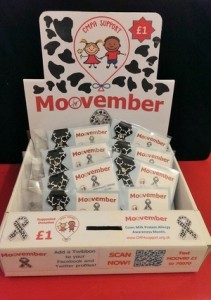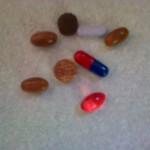Welcome to our lasted blog on the subject of Hay Fever. With 2013 set to be the worst in 50 years

Dr Pixie McKenna from Embarrasing Bodies
we conducted an interview with Dr Pixie McKenna the presenter of the TV series Embarrassing Bodies. Inter interview she tells us about Hay Fever, its treatments and the results of recent research.
The interview with Dr McKenna was conducted on behalf of PatientTalk.Org by Danielle Robinson.
DR PIXIE MCKENNA: My name is Dr Pixie McKenna, I’m a GP and doctor presenter on Channel 4’s Embarrassing Bodies.
ROBINSON: The study shows that the pollen count this year will be the highest for 50 years. Why is that?
DR PIXIE MCKENNA: This year the pollen count is going to be the highest in fifty years because, it’s no surprise, we’ve had some very bad summers and all the plants are going to be releasing their pollen at the same time, so we are just going to get a mass exodus of pollen which is going to make us all sneeze and wheeze. Normally you’ll get your tree pollen between March and May, your grass pollen between May and July and then your weeds between June and September, but they’re probably all coming to join the party at the same time and that is some time soon.
ROBINSON: If you have hay fever, are you allergic to all these different types of pollen or does it vary?
DR PIXIE MCKENNA: Not necessarily, you may find that you start to sneeze when the grass is out, you may find that when you’re out in the garden doing some weeding at the end of the summer that’s a problem, so you’re not necessarily allergic to every single type of pollen and there are over fifty different types, but most people find grass pollen particularly problematic.
ROBINSON: How is the pollen count actually calculated?
DR PIXIE MCKENNA: It’s a formula really, it’s the average number of pollen grams per cubic metre of air, which is very fancy, but for you and me really, the real deal is if it’s over fifty, you can get the daily pollen count from the Met Office, if it’s over fifty then you’re going to have symptoms.
ROBINSON: What is hay fever, for anyone that doesn’t suffer, what are the main symptoms, or if this is the first time, what should you be looking out for?
DR PIXIE MCKENNA: Well if you’ve never had hay fever before and you think you’ve got a bit of a summer cold or you’ve got a cold that’s lingering, particularly if it’s a runny nose that isn’t necessarily snotty or you don’t have a fever or you feel well otherwise, it’s more of an irritation than signs of infection, you could be coming down with hay fever. All it is, is your body’s response to what it perceives to be an allergen and that’s the pollen. So it comes in contact with the pollen and it mounts an immune response and the immune response is to get rid of this pollen. So you’re going to inhale the pollen or it’s going to go up your nose, or it’s going to go into your eyes, so any of those areas can flare up, watery eyes, sneezing nose or a little bit of wheeze.
ROBINSON: Can you develop hay fever at any stage in your life or is this something that if you’ve had as a kid you’ll always have?
DR PIXIE MCKENNA: You can develop hay fever at any stage in your life, particularly if you’ve moved house or if you lived in the city and you’ve moved to the country, that can be a problem. So generally house moves or sometimes if the immune system is very challenged, you’ll start to get symptoms when maybe for several summers in the past you’ve never ever had a problem.
ROBINSON: What are the most effective treatments for hay fever?
DR PIXIE MCKENNA: I think there are two issues with hay fever. What we want to do is first of all we want to prevent the symptoms, so you’ve got to get down the pharmacy. But interestingly most of us are more likely to go to the pharmacy, try and get drugs to fix it and not think of anything that we can do ourselves. Now what we’ve learned from the Hotpoint home allergy report is that we could be doing a lot more at home and by that I mean doing a bit of linen. We don’t tend to wash our sheets as frequently as we should and when we do put on a wash and we wash our clothes, over half of us are putting our clothes out on the clothes line. Now there are two issues there. First of all if you don’t wash your sheets on a regular basis, the pollen grains, the house dust mites and all the things that can trigger allergy are still in there, so you’re getting into bed with them every night. If you are very diligent and you wash all your clothes and you’ll decide you’ll give them a nice airing out on the clothes line, that’s not a good idea either because all you’re doing is you’re bringing all the allergens back into the house, or you’re wearing them every day once you’ve put your clothes back on. So you’ve got to get your clothes into the washing machine on a regular basis, wash them ideally at 60 degrees on an anti-allergy cycle and I know you’re not going to like this but you’ve got to dry them in the tumble dryer as well.
ROBINSON: Has there been a rise in the prevalence of hay fever in the past few years?
DR PIXIE MCKENNA: Hay fever has definitely gone up, as all allergic conditions have. I think generically because as children we’re getting exposed to fewer and fewer serious symptoms that challenge our immune systems, so we’re seeing things like pollen or dust as allergens or threats and we’re mounting an immune response, where maybe our grandmothers and things had so many other things that their system needed to deal with, when they came up against pollen or dust, they got on with it, so it’s because our systems aren’t being primed. It’s also because we’ve got a lot of pollution, we’ve got a lot of climate change and unfortunately, you can’t choose your parents. If you’ve got asthma, eczema, hay fever, any type of allergy in your family, you’re far more likely to get hay fever.
ROBINSON: Is there any advice you could give to somebody who’s started suffering with hay fever for the first time this year?
DR PIXIE MCKENNA: If you’ve just started suffering with hay fever, the key thing I think is don’t ignore it, get down to your pharmacy and get some treatment, that’s the first port of call. The second thing is look at the things in your own lifestyle that you can limit. So have a look at the Facebook page that backs up this survey, that’s facebook.com/hotpoint and that will tell you a lot about what you should be doing in terms of your washing. Invest in a nice pair of wrap around shades, the bigger the better and put some Vaseline round the inside of your nose to prevent you from getting exposed to pollen when you go out during the day. Ideally avoid things like cutting the grass, going for picnics, that type of thing, particularly when the pollen count is high. Check the pollen count and you’ll know when things are bad so try and limit the amount of time you spend outdoors on a very very muggy day, which is a high pollen count.
ROBINSON: Where can people go for more information?
DR PIXIE MCKENNA: You can also get some more information on the http://www.allergyuk.org/home/home website.
To see our previous blog on hay fever please go to https://patienttalk.org/?p=308



